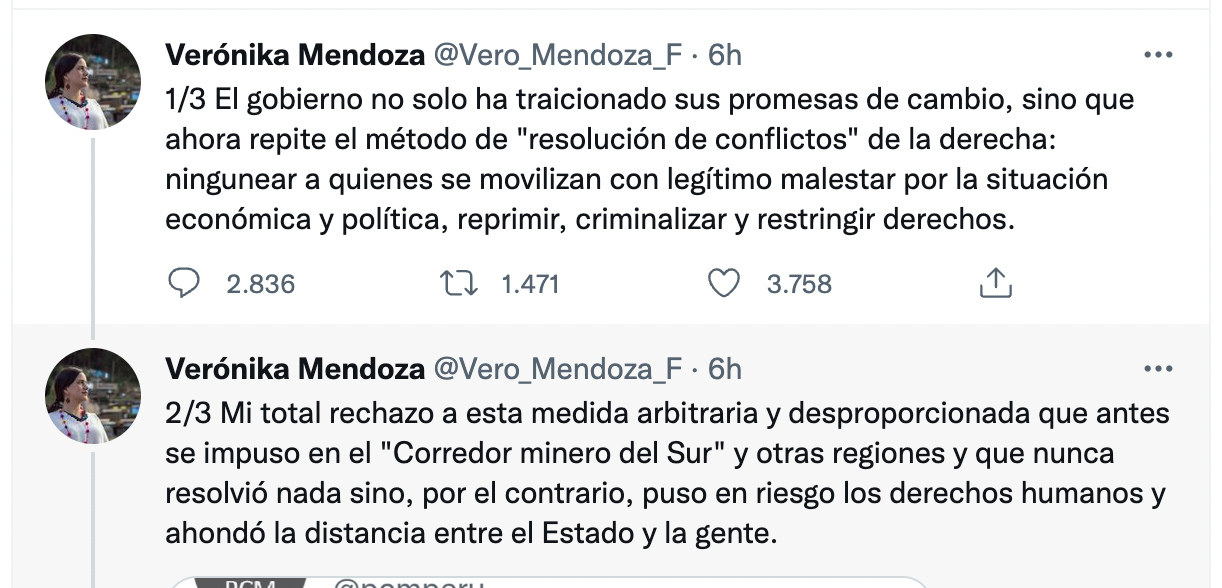
Former Juntos por Peru presidential candidate Verónika Mendoza, after a long time absence on social media, spoke out about the curfew decreed by the President of the Republic Pedro Castillo and mentioned through a thread that “the Government has betrayed its promises of change”.
“The government has not only betrayed its promises of change, but now repeats the right-wing method of “conflict resolution”: to deny those who mobilize with legitimate unease over the economic and political situation, to suppress, criminalize and restrict rights,” he said.
It also rejected the curfew measure in its entirety. “My total rejection of this arbitrary and disproportionate measure that was previously imposed in the “Southern Mining Corridor” and other regions and which never solved anything but, on the contrary, put human rights at risk and deepened the distance between the State and the people,” he confirmed.
He concluded by specifying what the solutions would have to be to stop this transport strike that has been going on since last Monday, March 28 and which is still going on in the different regions of the country.
“Dialogue, concrete measures to stop rising prices, economic and political reforms are what is urgent NOW,” he concluded.

WHAT DOES THE SUPREME DECREE OF THE CURFEW SAY?
This emergency decree, among its justifications considers that “Article 44 of the Political Constitution of Peru provides that they are duties to ensure the full observance of human rights, to protect the population from threats to their security and to promote the general welfare based on justice and on the integral and balanced development of the nation”.
“Article 137 of the Magna Carta establishes that the President of the Republic, with the agreement of the Council of Ministers, may, for a fixed period of time, decree throughout the national territory, or in part of it, and reporting to Congress or the Standing Committee, the states of emergency referred to in that article, including the State of Emergency, in the event of disturbance of peace or internal order, catastrophe or serious circumstances affecting the life of the Nation, and the exercise of constitutional rights relating to liberty and security of person, the inviolability of the home, and the freedom of assembly and transit in the territory”.
In addition, “that, considering the current context due to the actions taken during the above-mentioned protest measures, it is necessary to modify the provisions related to the suspension of the exercise of constitutional rights, in order to protect public order and internal order, as well as the life and health of the /as Peruvians”
“Amendment to Article 2 of Supreme Decree No. 025-2022-PCM, which extends the State of Emergency in Metropolitan Lima in the Department of Lima and in the Constitutional Province of Callao
Amend article 2 of Supreme Decree No. 025-2022-PCM, which extends the State of Emergency in Metropolitan Lima in the Department of Lima and in the Constitutional Province of Callao, to read as follows:
Endorsement
The Supreme Decree is endorsed by the president of the Council of Ministers, the Minister of the Interior, the Minister of Defence and the Minister of Justice and Human Rights.
The standard, published in an extraordinary edition of the Legal Standards booklet of the Official Gazette El Peruano, is signed by the President of the Republic, Pedro Castillo, and by the president of the Council of Ministers, Aníbal Torres.
Also, by Ministers José Luis Gavidia Arrascue (Defence), Alfonso Chávarry Estrada (Interior) and Félix Chero Medina (Justice and Human Rights).
KEEP READING
Últimas Noticias
Debanhi Escobar: they secured the motel where she was found lifeless in a cistern

The oldest person in the world died at the age of 119

Macabre find in CDMX: they left a body bagged and tied in a taxi
The eagles of America will face Manchester City in a duel of legends. Here are the details

Why is it good to bring dogs out to know the world when they are puppies




